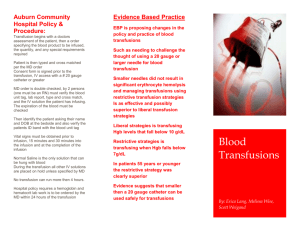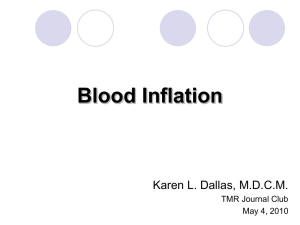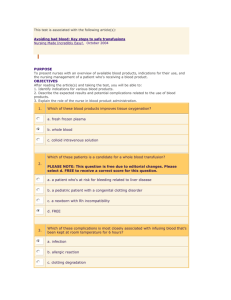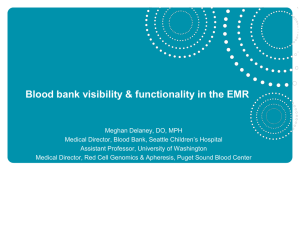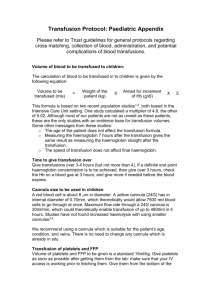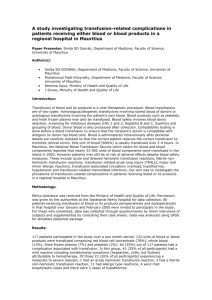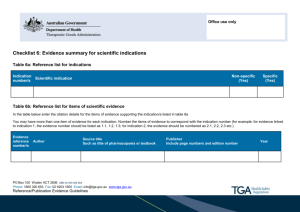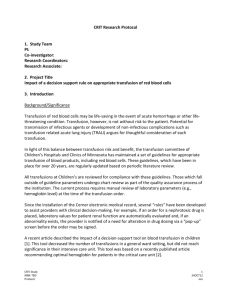New Blood Products order set and guidelines
advertisement
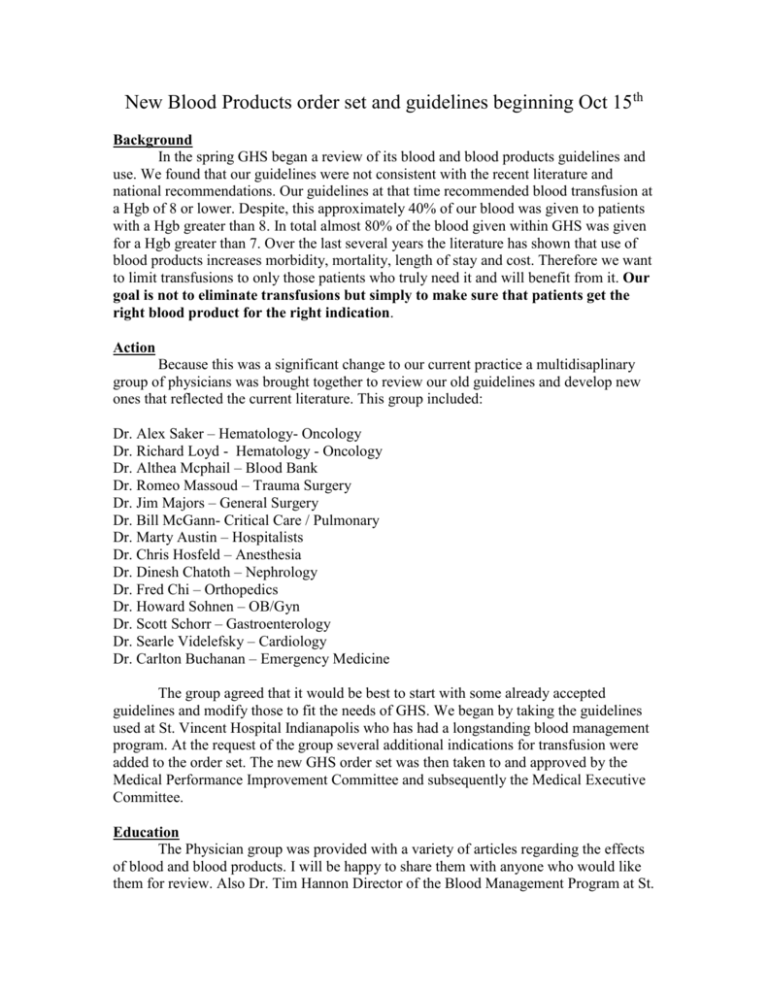
New Blood Products order set and guidelines beginning Oct 15th Background In the spring GHS began a review of its blood and blood products guidelines and use. We found that our guidelines were not consistent with the recent literature and national recommendations. Our guidelines at that time recommended blood transfusion at a Hgb of 8 or lower. Despite, this approximately 40% of our blood was given to patients with a Hgb greater than 8. In total almost 80% of the blood given within GHS was given for a Hgb greater than 7. Over the last several years the literature has shown that use of blood products increases morbidity, mortality, length of stay and cost. Therefore we want to limit transfusions to only those patients who truly need it and will benefit from it. Our goal is not to eliminate transfusions but simply to make sure that patients get the right blood product for the right indication. Action Because this was a significant change to our current practice a multidisaplinary group of physicians was brought together to review our old guidelines and develop new ones that reflected the current literature. This group included: Dr. Alex Saker – Hematology- Oncology Dr. Richard Loyd - Hematology - Oncology Dr. Althea Mcphail – Blood Bank Dr. Romeo Massoud – Trauma Surgery Dr. Jim Majors – General Surgery Dr. Bill McGann- Critical Care / Pulmonary Dr. Marty Austin – Hospitalists Dr. Chris Hosfeld – Anesthesia Dr. Dinesh Chatoth – Nephrology Dr. Fred Chi – Orthopedics Dr. Howard Sohnen – OB/Gyn Dr. Scott Schorr – Gastroenterology Dr. Searle Videlefsky – Cardiology Dr. Carlton Buchanan – Emergency Medicine The group agreed that it would be best to start with some already accepted guidelines and modify those to fit the needs of GHS. We began by taking the guidelines used at St. Vincent Hospital Indianapolis who has had a longstanding blood management program. At the request of the group several additional indications for transfusion were added to the order set. The new GHS order set was then taken to and approved by the Medical Performance Improvement Committee and subsequently the Medical Executive Committee. Education The Physician group was provided with a variety of articles regarding the effects of blood and blood products. I will be happy to share them with anyone who would like them for review. Also Dr. Tim Hannon Director of the Blood Management Program at St. Vincent Hospital will be giving 3 lectures on Blood Management on Thursday Oct 11th. In order to accommodate varying schedules, he will be lecturing at 8 am, 12 noon and 6 pm. He is an expert in Blood Management and can answer any questions you have. I hope that you can attend one of these meetings. Implementation We will begin using the order set on Oct 15th. As of Nov 1st we will begin collecting data on its use. Possible questions you might have As a physician what is expected of me? When you order blood, instead of simply writing “Transfuse 2 units PRBC” you will be asked to use the “Blood Component Order form”. On it you will be asked to give the indication for transfusion. What if I forget to use the form? Will my patient still get the blood they need? Yes we will not delay the transfusion as needed. You will be called by the nurse who will ask you for the indication and will complete the form as a verbal order. What if I refuse to fill out the form or don’t have an appropriate indication for transfusion? This is a new process and a different way of doing things. Therefore from Nov 1st thru Jan 1st will be an educational period. During that time the Committee will simply send education letters to the involved MD. After Jan 1st those cases will be referred to the Dept Chiefs for follow up and response. Why another form to fill out? Don’t we have enough forms already! Changing longstanding practice patterns is a challenge. We could have spent significant amounts of time and energy trying to educate everyone on the new guidelines. Despite this it is my experience that we would have had little success and would have had little impact on our current practice patterns. The group of physicians involved felt that the annoyance of another form was far outweighed by the educational benefit of having the new guidelines on the order set. What if my indication isn’t listed on the order set? It would have been impossible to list all of the rare indications for transfusion. Instead we placed “other” as an option and ask that you simply write in the indication. These will be reviewed by the Blood Management committee for appropriateness and if felt to be inappropriate will be forwarded to the Chief of the Department. What areas of the hospital does this apply to? Currently it will only apply to inpatient and OR. It will not apply to outpatients and outpatient surgery. It also only applies to adults. This is a new process that we think will lead to better outcomes for our patients. Fewer infections, shorter lengths of stay and lower costs. Like anything else it will be a work in progress and I ask that you bear with us as we institute it. If you have any questions or concerns regarding this order set and policy please feel free to contact me. K. Carlton Buchanan Jr. MD Interim, Chief Medical Officer

